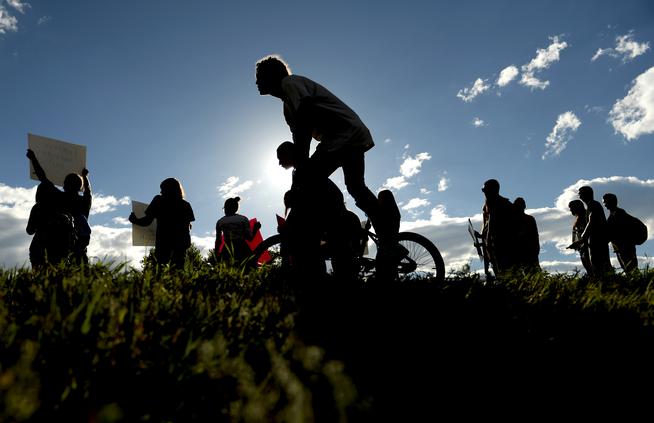Patriotism, Progress, and Defining America’s Past

Students protesting against a Jefferson County Board of Education proposal to review the curriculum, September 23, 2014. (RJ Sangosti, The Denver Post)
When the high school students in Denver took to the streets to protest the changes to make their history curriculums more patriotic, they were making a point that, as Eugene Debs put it, “intelligent discontent is the mainspring of civilization.” Progress, from this viewpoint, is created by people who actively disagree with the system and the way things are being run. In order for people to make this decision for themselves, it is necessary that they understand all sides of an issue to fully feel the weight of its impact on people other than those in power. For the school board to intentionally bias their education is a way to prevent potential disagreement with the system as a whole.
According to the logic from those on the school board in Jefferson County, Colorado, and many other conservatives, it is important that students learn the patriotic view of history to prevent them from thinking that America is a bad place. It is artificial, however, to construct and impose the view of a free and equal America. This revised history reflects the realities of only the privileged, who have historically been the ones to dictate the “official” version of history. The version that they are trying to enforce in schools minimizes the struggles of anyone who is not part of this privileged class. The prevalent idea in academic thinking is that it is scientific and representative of an objective truth that has been tested and proven over time by the entire community. In history, therefore, the beliefs of those who have always had the most power have held up as the dominant narratives. Manifest destiny and colonialism, for example, are often celebrated within the United States as symbols of progress, marked by the imposition of “superior” ideas. “What great nation,” conservative politician and commentator Patrick Buchanan asks in a recent blog post defending Columbus Day, “what great empire, what great civilization ever rose on a belief in the equality of all other peoples and all other faiths?” Because, after all, “How else…does civilization progress, of not through the imposition by superior men of superior ideas?”
Part of a well-rounded education should be learning to question dominant frameworks. It is these analytical skills which allow us to ask questions about beliefs like Buchanan’s. How was it decided that the “superior men” imposing their “superior ideas” were truly superior at all? Are they being called superior because they were able to conquer other groups of people? Does might, then, really make right? The implications of this supposition are enormous, leading us not only to justify systems of oppression within our society, but also literally to sort people into categories to be labelled as lesser if they do not assimilate with historically dominant ideals, which is not always entirely possible with specific ethnic or cultural backgrounds. It also becomes necessary to maintain the “superiority” of these ideals, usually through violent and repressive means. According to the U.S. census, Latinos are twice as likely as whites to be incarcerated, and African Americans are five times as likely. This is not an accident. It is for the same reasons that historically, non-whites have been kept from equality through segregation, legal discrimination, unequal pay, slavery, genocide, racism, militant border patrol, repression of speech, and other oppressive tactics. When these strategies prevent non-whites from having the same opportunities for success as white people, it is easier to justify their disenfranchisement. It is easier to maintain the dominant perceptions of white people as the superior race with superior cultural ideals and to continue to create public policy accordingly.
Although, as Buchanan points out, this system of maintaining ideals is a deeply rooted part of American history, intelligent protest by the people has been America’s primary source of progress in recognizing and respecting the humanity of all kinds of people, and education is key to creating change. Education is not indoctrination, it is learning to interrogate the material in a meaningful way. To downplay civil disobedience as an important part of United States history is to ignore a key part of the democratic process. In the Denver schools, this effort discourages students from asking real questions about the way our systems work and have worked for centuries. Learning to question our political and social systems is necessary to develop critical thinking skills, which are key for citizens to create positive social change.
Kristen Sibbald
Editor-in-Chief
Scripps ’17

![[in]Visible Magazine](https://community.scrippscollege.edu/invisible/wp-content/uploads/sites/5/2011/04/Invisible-Masthead-2011-Spring1.png)







No comments yet... Be the first to leave a reply!